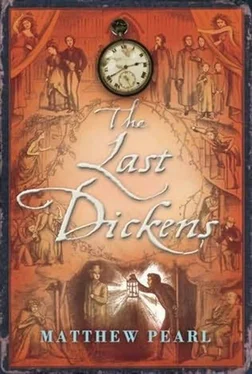“Very well,” the waiter huffed. He knocked on the door to the room and said there was a caller. Would Dickens allow him to enter?
“I'll be damned if I will!” came the novelist's reply from behind the door.
The waiter grinned triumphantly. Tom stood for a few more moments then, relenting, began to walk away. Just before opening the door to his own room, he heard sounds of a struggle-someone being strangled, a woman screaming out-all coming from inside Dickens's room. The waiter at the door looked paralyzed with fear. Tom ran back and dashed through Dickens's door.
There was Dickens in his velvet dressing gown, alone, standing before the massive mirror, his face wildly contorted and his hands squeezing a blanket as though it were his enemy's throat.
“Branagan! Come in,” he said cheerfully.
“Chief, I thought I heard…” Tom began, doubting his own senses.
“Ah, yes,” Dickens replied, laughing and then coughing. “I was just practicing a new short reading I've made-very different from the others. I have adapted and cut about the text with great care. Close the door there, if you would, and you'll hear some of it.”
The reading from Oliver Twist , one of the earliest novels of his career, told of Bill Sikes, the criminal, beating and killing his lover, Nancy, for betraying him by helping orphan Oliver's cause. Dickens acted this out step by step with vigor and violence that all brought out the inevitability of death. Tom felt a chill through his body as he seemed to watch the honest prostitute die before his eyes.
When it was done, Dickens fell back into an armchair and rolled his head in a circle to the left and right. “Nobody has seen it yet,” he said excitedly when he had his breath back. “I told Dolby, Fields, and Osgood about it at dinner. I have been trying it secretly, but I get something so horrible out of it I am afraid to do it in public.”
“It was petrifying, Chief. If any one woman in the audience screams, there could be an outbreak of hysteria.”
“I know it.”
“I suppose you can't sleep well with that on your mind,” Tom wondered.
“I can't sleep anyway! I have been coughing badly for three hours now and have not closed my eyes. Laudanum is the only thing that has done me good, but even soporifics fail me tonight. I have tried allopathy, homeopathy, cold things, warm things, sweet things, bitter things, stimulants, narcotics.”
Dickens pulled out the opiate mixture made from the various vials in his traveling medicine case and took another bitter spoonful. His previous energy had drained from him in the way it did when an actor went behind the back curtain after a scene. There was a sense that a combination of exhaustion and narcotics had taken a full hold of him.
“I hope to get sword in hand again soon,” said Dickens wearily. “I am as restless, Branagan, as if I were behind bars in the zoological gardens. If I had any to spare, I would wear a part of my mane away by rubbing it against the windows of my cage.”
“Chief, you asked me before to be honest,” said Tom.
“Did I?” Dickens asked, sucking at his tongue. “What do you say? Perform the new scene or not? I thought it was one of my finest. Though perhaps I should not commit the murder in America, it may be too much for this country's sensibilities.”
Tom had to raise his voice to be heard over the other man's regular bouts of coughing. “Mr. Dickens, not that. I am concerned about Louisa Barton, the woman who came into your room once before, and has attended your readings regularly, following us to New York and assaulting that widow, possibly stealing your diary: I believe that lady could be looking for you here tonight.”
“Even with the Argus-eyed guardian at my door?” Dickens asked sarcastically. “You have a reason to think so tonight in particular, Mr. Branagan, I take it.”
“The last series of Boston readings have been canceled-I'll be bound she would have attended, and I know not what the result on her mental state would be after being denied this. This is the last night-she will try something to find you and get what she has wanted from you.”
“Which is what?”
Tom's confidence waned. “I don't know.”
“Have you finished?” Dickens asked angrily.
“I have said what I feel.”
“Your infernal caution will be your ruin one of these days!” said Dickens, releasing a loud sigh, and he sat at his desk. Tom knew his words had not been persuasive enough, even to his own ears, but was surprised at Dickens's furor. He readied himself to leave the room.
“Wait. Very well, Branagan.”
“Chief?” Tom asked. He turned around and saw Dickens wiping a tear from his eye.
“Forgive me. I know you are right. Before I left England, you see, I received various letters warning me of danger by my coming to America. Anti-Dickens feeling, Anti-English feeling, New York rowdyism, and I don't know what else. As I had already decided to come here, upon my soul I resolved to say no word about it to anyone, not even Dolby, especially not that old beadle, Forster, who thought my soul would evaporate the moment he was Godspeeding me!”
“Then you thought the measures I have urged on Mr. Dolby were needed?”
“That was why I agreed that you watch my door that night. Imagine being a man who needs a bodyguard as though from phantom goblins and ghouls! I wonder was Milton visited by angels or by devils when he wrote-and who is it that appears to me?
“I know you have taken pains to understand it, my good Branagan,” Dickens continued. “You have seen for yourself how I am beset, waylaid, mashed, bruised, and pounded by the crowds. Never have I known less of myself in all my life than in these United States of America. My boy, if I greeted you in poor spirits when you knocked at the door, I assure you I repent it. A character not under my own control takes over when I practice a reading. Now, what do you suggest we do? If I am to begin something, I begin it at once.”
Tom had not yet concocted a plan. He thought quickly. “Chief, I would just as soon to catch this lady red-handed so she can never again bother you.”
“Please God! What do you say we do, then?” the novelist asked impatiently. “Much better to die doing, Branagan, than to wait. I have always felt of myself that I must die in harness one day.”
Tom's improvised proposition was this: Tom must take Dickens's place in his bed. Dickens would quietly slip into the adjoining suite of rooms usually occupied by George Dolby. If the intruder made her way inside as she had their first week in Boston, expecting the novelist, she would find Tom waiting instead. And if Mrs. Barton did not show up, they could toast the Chief's safety on their way out of the city.
Dickens contemplated this plan and quickly assented. He first gathered up some personal belongings from the bureau and the desk drawers and placed them in a calf-leather case.
“Do you believe in the wisdom of dreams, Branagan?” the writer asked as he did.
Tom thought of his strange Staplehurst dream. “Do you mean whether I believe they tell us what is to come?”
“Surely, surely. Or what has come to pass already. I dreamed once of my dear friend Jerrold, the dramatist. In the dream, he handed me something he wrote, though it was not in his own hand, and he was anxious that I should read it for my own safety. I looked but could not make out a word of it! I woke in great perplexity, with its strange character quite fresh in my sight. The next day, to my astonishment, I learned Jerrold had died.”
Tom searched for a response. Dickens bowed his head slightly as though he had just finished another dramatic reading. Tom worried what Dickens's fascination with the dream meant for his own health and well-being.
Читать дальше












